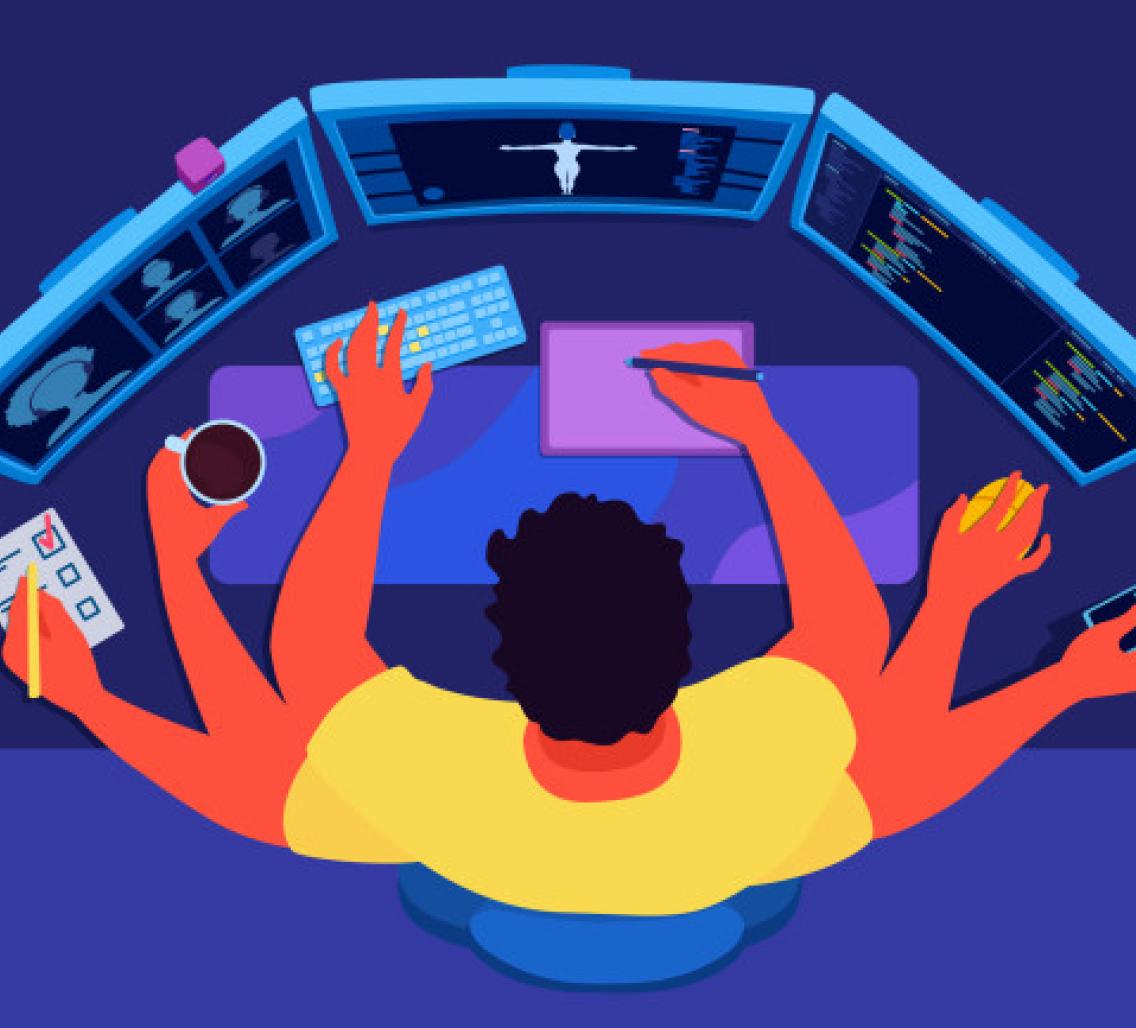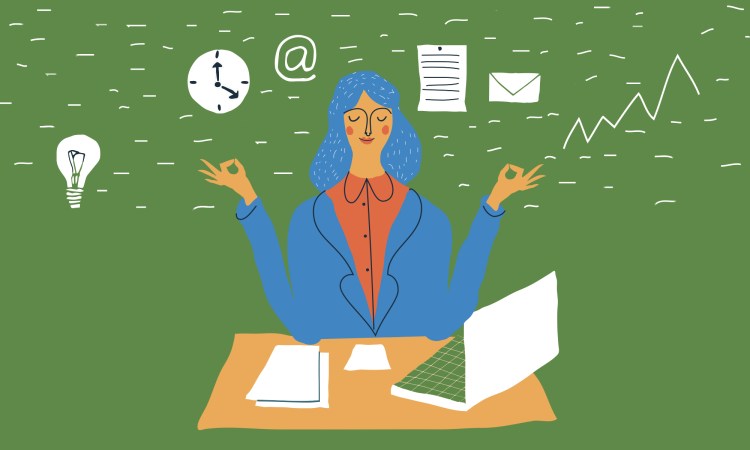Why multitasking does more harm than good

If you’ve ever opened another tab and made the grocery order during a Zoom meeting, folded laundry while helping your kids with their homework, or listened to a podcast while working out, you’ve been guilty of multitasking. Why guilty? Isn’t this just being super efficient? Not really. A growing body of research has found that it’s far less efficient to try to do two (or more!) things at once than to focus on just one task at a time. Multitasking can interfere with working memory , cause students to do worse in school, and could possibly even create potentially long-term memory problems .

Your Brain While Multitasking
When we take on a task, several brain networks dealing with attention and cognitive control are involved. These are the frontoparietal control network, the dorsal attention network, and the ventral attention network. Attempts to multitask can create interference among these networks, and this can lead to slower processing as well as mistakes, explains Kevin Paul Madore, a neuroscientist at Stanford University. “One way we can examine the effects of multitasking on behavior and the demands it places on relevant brain networks is by analyzing ‘task switch costs,'" he says.
A switch cost is a loss of accuracy or speed that comes when you shift between tasks. Though some of the costs of multitasking are subtle, they are by no means trivial. Too much multitasking can interfere with both working memory and long-term memory. Research by Madore and colleagues found that heavier media multitasking is associated with attention lapses and forgetfulness. However, it’s still not clear what’s causing what. “ Some research has indicated that chronic everyday media multitasking is related to errors in our ability to hold and use information in mind (working memory) and our ability to retrieve information (long-term memory),” says Madore, but he adds that more research is needed to determine the direction of causality.
Still, whether you’re less efficient because you’re multitasking or you’re multitasking because you’re less efficient (why is that to-do list so long?), multitasking doesn’t really solve anything.
Multitasking Light
It might seem that some types of multitasking are easier to pull off than others. Sure, texting while driving is a no-go , but surely folding the laundry while helping the kids with their homework is easy enough. But no, that doesn’t work either. You’re not risking life and limb — yours or anyone else’s — when you combine laundry and school work, but you’re still not going to be able to do your best at either task when trying to do both at once. “When you have competing sources of attention, your task performance is often going to be reduced,” says Madore. “You’re probably slower at folding laundry or maybe you drop some things on the floor when you’re helping a child with homework versus folding laundry alone.”
Dropping a few socks is not a big deal, and certainly worth the cost of having some time with your kids (though being with your kids while not giving them your full attention might have its own costs). On the other hand, some of the consequences of trying to do two things at once, even if those things seem simple, can be horrific — having a car accident, for example. Even eating a sandwich or fiddling with the CD player while driving can increase your risk of an accident.
There’s at least one situation, though, where multitasking can be your friend. Some studies have shown that taking a walk while trying to sort out a thorny problem improves creativity and can help you come up with better solutions. So perhaps when we’re trying to figure out how to get through that seemingly endless to-do list, we should forget about trying to do two or three of those things at once and go out for a walk. That might just lead to a creative solution to the time crunch problem.
- Bipolar Disorder
- Therapy Center
- When To See a Therapist
- Types of Therapy
- Best Online Therapy
- Best Couples Therapy
- Best Family Therapy
- Managing Stress
- Sleep and Dreaming
- Understanding Emotions
- Self-Improvement
- Healthy Relationships
- Student Resources
- Personality Types
- Verywell Mind Insights
- 2023 Verywell Mind 25
- Mental Health in the Classroom
- Editorial Process
- Meet Our Review Board
- Crisis Support
How Multitasking Affects Productivity and Brain Health
Kendra Cherry, MS, is a psychosocial rehabilitation specialist, psychology educator, and author of the "Everything Psychology Book."
:max_bytes(150000):strip_icc():format(webp)/IMG_9791-89504ab694d54b66bbd72cb84ffb860e.jpg)
Amy Morin, LCSW, is a psychotherapist and international bestselling author. Her books, including "13 Things Mentally Strong People Don't Do," have been translated into more than 40 languages. Her TEDx talk, "The Secret of Becoming Mentally Strong," is one of the most viewed talks of all time.
:max_bytes(150000):strip_icc():format(webp)/VW-MIND-Amy-2b338105f1ee493f94d7e333e410fa76.jpg)
Gpointstudio / Getty Images
- Multitasking and Productivity
Brain Function in Multitaskers
- Break the Habit
Frequently Asked Questions
What is multitasking.
Multitasking involves working on two or more tasks simultaneously, switching back and forth from one thing to another, or performing a number of tasks in rapid succession.
Is multitasking a good thing? While multitasking seems like a great way to get a lot done at once, research has shown that our brains are not nearly as good at handling multiple tasks as we like to think they are. In fact, some research suggests that multitasking can actually hamper your productivity by reducing your comprehension, attention, and overall performance.
What is it that makes multitasking such a productivity killer? It might seem like you are accomplishing multiple things at the same time, but what you are really doing is quickly shifting your attention and focus from one thing to the next. Switching from one task to another may make it difficult to tune out distractions and can cause mental blocks that can slow you down.
Examples of Multitasking
- Starting two projects at the same time
- Listening to the radio while driving to work
- Talking on the phone while typing an assignment
- Watching television while responding to work emails
- Scrolling through social media while in a meeting
- Listening to a person talk while writing a to-do list
How Multitasking Hampers Productivity
Multitasking takes a serious toll on productivity . Our brains lack the ability to perform multiple tasks at the same time—in moments where we think we're multitasking, we're likely just switching quickly from task to task. Focusing on a single task is a much more effective approach for several reasons.
Multitasking Is Distracting
Multitaskers may feel more distracted than people who focus on one task at a time. This makes sense when you consider that, by habit, multitaskers constantly refocus on a new task, effectively distracting themselves from their original assignment.
Some research suggests that multitaskers are more distractible, and they may have trouble focusing their attention even when they're not working on multiple tasks at once.
Other research shows that while there may be a connection between multitasking and distraction, that link is smaller than originally thought and varies quite a bit from person to person.
Multitasking Slows You Down
While it may seem contrary to popular belief, we tend to work slower and less efficiently when we multitask. Multitasking leads to what psychologists call "task switch costs," or the negative effects that come from switching from task to task. We encounter task switch costs (like a slower working pace) because of the increased mental demand that's associated with jumping from one thing to another.
Changing our focus also keeps us from relying on automatic behaviors to finish tasks quickly. When we're focused on a single task that we've done before, we can work on "autopilot," which frees up mental resources. Switching back and forth bypasses this process, and we tend to work more slowly as a result.
Multitasking Impairs Executive Function
Multitasking is managed by executive functions in the brain . These control and manage cognitive processes and determine how, when, and in what order certain tasks are performed. There are two stages to the executive control process:
- Goal shifting : Deciding to do one thing instead of another
- Rule activation : Changing from the rules for the previous task to the rules for the new task
Moving through these stages may only add a few tenths of a second, but it can start to add up when people switch back and forth repeatedly. This might not be a big deal when you are folding laundry and watching television at the same time.
However, if you are in a situation where safety or productivity is important, such as when you are driving in heavy traffic, even small amounts of time can prove critical.
Multitaskers Make Mistakes
Multitasking may lower your performance and make you more prone to making mistakes. Research has shown that students who multitask in class tend to have lower GPAs (and, if they continue multitasking at home, they often take longer to finish their homework).
Adults may also experience lower performance while multitasking. One 2018 study found that older adults were likely to make more mistakes while driving if they were multitasking.
Doing several different things at once can impair cognitive ability , even for people who multitask frequently. In fact, research suggests that people tend to overestimate their ability to multitask, and the people who engage in this habit most frequently often lack the skills needed to be effective at it.
Chronic multitaskers tend to show more impulsivity than their peers, and they may be more likely to downplay possible risks associated with tackling multiple things at once. They also seem to show lower levels of executive control and are often distracted easily.
Limited cognitive resources may be involved in this phenomenon. Several networks in the brain interact to guide our behavior whenever we set out to complete a task. This behavior includes:
- Setting a goal
- Identifying the information we need to achieve it
- Disregarding irrelevant distractions
When we try to engage in this process for multiple tasks at once, it can lead to cognitive errors. We might fail to disregard irrelevant information, for instance, which would lead to more distraction.
The research isn't clear on the exact relationship between multitasking and brain function. It's possible that chronic multitasking changes the brain over time, leading to more distractibility and problems with focus, or it may be that people with these traits are more likely to multitask in the first place.
Teens and Multitasking
The negative impact of chronic, heavy multitasking might be particularly detrimental to adolescent minds. At this age, brains are busy forming important neural connections. Spreading attention so thin and constantly being distracted by different streams of information might have a serious, long-term, negative impact on how these connections form.
Media Multitasking
Some research suggests that people who engage in media multitasking (using more than one form of media or type of technology at once) might be better at integrating visual and auditory information.
In one study, participants between the ages of 19 and 28 were asked to complete questionnaires regarding their media usage. The participants then completed a visual search task both with and without a sound to indicate when an item changed color.
Heavy multitaskers performed better on the search when the sound was presented, indicating that they were more adept at integrating the two sources of sensory information . Conversely, heavy multitaskers performed worse than light/medium multitaskers when the tone was not present.
Break the Multitasking Habit
If you feel like multitasking is negatively impacting your life, it is possible to make some changes that will increase your productivity and efficiency. Next time you find yourself multitasking, take a quick assessment of the various things you are trying to accomplish. Then, determine which task you need to focus on first. Try to:
- Limit the number of things you juggle at any given time to just one task . If you do need to work on multiple things at once, try to combine something automatic, like folding laundry, with something that requires more focus, like having a conversation.
- Use the "20-minute rule." Instead of constantly switching between tasks, try to fully devote your attention to one task for 20 minutes before switching to the other.
- Batch your tasks . If you're having trouble resisting the urge to check your email or engage in another distracting task, schedule a set time in your day to tackle it. By batching similar tasks together and setting a time to handle them, you can free your mind up to focus on something else.
- Limit distractions . This may mean seeking out a quieter place to work, switching your phone off, and turning off notifications and alarms.
- Practice mindfulness . Adding mindfulness to your daily routine may help you notice the times when you're multitasking. Mindfulness can also improve your ability to focus and pay attention to one thing at a time.
Working on one task at a time may help you become more productive and it may make each task more enjoyable.
Yes, it can be. Multitasking may reduce your ability to focus, increase feelings of stress, and exacerbate impulsiveness. It can also worsen your performance at work or school, which can lead to further negative feelings and anxiety.
It means that, like most of us, their brain isn't wired to work on multiple complex tasks simultaneously. We perform much better when we focus fully on one thing at a time.
You should consider whether or not you're really able to multitask before adding it to your resume. We have a tendency to overestimate our ability to multitask, and even people who think they're skilled in this area often make mistakes or work inefficiently.
Jeong S-H, Hwang Y. Media multitasking effects on cognitive vs. attitudinal outcomes: A meta-analysis . Hum Commun Res . 2016;42(4):599-618. doi:10.1111/hcre.12089
Madore KP, Wagner AD. Multicosts of multitasking . Cerebrum . 2019;2019:cer-04-19.
Moisala M, Salmela V, Hietajärvi L, et al. Media multitasking is associated with distractibility and increased prefrontal activity in adolescents and young adults . NeuroImage . 2016;134:113-121. doi:10.1016/j.neuroimage.2016.04.011
Wiradhany W, Koerts J. Everyday functioning-related cognitive correlates of media multitasking: A mini meta-analysis . Media Psychol . 2021;24(2):276-303. doi:10.1080/15213269.2019.1685393
Rubinstein JS, Meyer DE, Evans, JE. Executive control of cognitive processes in task switching . J Exp Psychol Human. 2001;27(4):763-797. doi:10.1037/0096-1523.27.4.763
Bellur S, Nowak KL, Hull KS. Make it our time: In class multitaskers have lower academic performance . Comput Hum Behav . 2015;53:63-70. doi:10.1016/j.chb.2015.06.027
Wechsler K, Drescher U, Janouch C, Haeger M, Voelcker-Rehage C, Bock O. Multitasking during simulated car driving: A comparison of young and older persons . Front Psychol . 2018;0. doi:10.3389/fpsyg.2018.00910
Sanbonmatsu DM, Strayer DL, Medeiros-Ward N, Watson JM. Who multi-tasks and why? Multi-tasking ability, perceived multi-tasking ability, impulsivity, and sensation seeking . PLOS ONE . 2013;8(1):e54402. doi:10.1371/journal.pone.0054402
Uncapher MR, Lin L, Rosen LD, et al. Media multitasking and cognitive, psychological, neural, and learning differences . Pediatrics . 2017;140(Supplement 2):S62-S66. doi:10.1542/peds.2016-1758D
Lui KFH, Wong AC-N. Does media multitasking always hurt? A positive correlation between multitasking and multisensory integration . Psychon Bull Rev . 2012;19(4):647-653. doi:10.3758/s13423-012-0245-7
By Kendra Cherry, MSEd Kendra Cherry, MS, is a psychosocial rehabilitation specialist, psychology educator, and author of the "Everything Psychology Book."

The Myth of Multitasking
Christine Rosen
In one of the many letters he wrote to his son in the 1740s, Lord Chesterfield offered the following advice: “There is time enough for everything in the course of the day, if you do but one thing at once, but there is not time enough in the year, if you will do two things at a time.” To Chesterfield, singular focus was not merely a practical way to structure one’s time; it was a mark of intelligence. “This steady and undissipated attention to one object, is a sure mark of a superior genius; as hurry, bustle, and agitation, are the never-failing symptoms of a weak and frivolous mind.”
In modern times, hurry, bustle, and agitation have become a regular way of life for many people — so much so that we have embraced a word to describe our efforts to respond to the many pressing demands on our time: multitasking . Used for decades to describe the parallel processing abilities of computers, multitasking is now shorthand for the human attempt to do simultaneously as many things as possible, as quickly as possible, preferably marshalling the power of as many technologies as possible.
In the late 1990s and early 2000s, one sensed a kind of exuberance about the possibilities of multitasking. Advertisements for new electronic gadgets — particularly the first generation of handheld digital devices — celebrated the notion of using technology to accomplish several things at once. The word multitasking began appearing in the “skills” sections of résumés, as office workers restyled themselves as high-tech, high-performing team players. “We have always multitasked — inability to walk and chew gum is a time-honored cause for derision — but never so intensely or self-consciously as now,” James Gleick wrote in his 1999 book Faster . “We are multitasking connoisseurs — experts in crowding, pressing, packing, and overlapping distinct activities in our all-too-finite moments.” An article in the New York Times Magazine in 2001 asked, “Who can remember life before multitasking? These days we all do it.” The article offered advice on “How to Multitask” with suggestions about giving your brain’s “multitasking hot spot” an appropriate workout.
But more recently, challenges to the ethos of multitasking have begun to emerge. Numerous studies have shown the sometimes-fatal danger of using cell phones and other electronic devices while driving, for example, and several states have now made that particular form of multitasking illegal. In the business world, where concerns about time-management are perennial, warnings about workplace distractions spawned by a multitasking culture are on the rise. In 2005, the BBC reported on a research study, funded by Hewlett-Packard and conducted by the Institute of Psychiatry at the University of London, that found, “Workers distracted by e-mail and phone calls suffer a fall in IQ more than twice that found in marijuana smokers.” The psychologist who led the study called this new “infomania” a serious threat to workplace productivity. One of the Harvard Business Review ’s “Breakthrough Ideas” for 2007 was Linda Stone’s notion of “continuous partial attention,” which might be understood as a subspecies of multitasking: using mobile computing power and the Internet, we are “constantly scanning for opportunities and staying on top of contacts, events, and activities in an effort to miss nothing.”
Dr. Edward Hallowell, a Massachusetts-based psychiatrist who specializes in the treatment of attention deficit/hyperactivity disorder and has written a book with the self-explanatory title CrazyBusy , has been offering therapies to combat extreme multitasking for years; in his book he calls multitasking a “mythical activity in which people believe they can perform two or more tasks simultaneously.” In a 2005 article, he described a new condition, “Attention Deficit Trait,” which he claims is rampant in the business world. ADT is “purely a response to the hyperkinetic environment in which we live,” writes Hallowell, and its hallmark symptoms mimic those of ADD. “Never in history has the human brain been asked to track so many data points,” Hallowell argues, and this challenge “can be controlled only by creatively engineering one’s environment and one’s emotional and physical health.” Limiting multitasking is essential. Best-selling business advice author Timothy Ferriss also extols the virtues of “single-tasking” in his book, The 4-Hour Workweek .
Multitasking might also be taking a toll on the economy. One study by researchers at the University of California at Irvine monitored interruptions among office workers; they found that workers took an average of twenty-five minutes to recover from interruptions such as phone calls or answering e-mail and return to their original task. Discussing multitasking with the New York Times in 2007, Jonathan B. Spira, an analyst at the business research firm Basex, estimated that extreme multitasking — information overload — costs the U.S. economy $650 billion a year in lost productivity.
Changing Our Brains
To better understand the multitasking phenomenon, neurologists and psychologists have studied the workings of the brain. In 1999, Jordan Grafman, chief of cognitive neuroscience at the National Institute of Neurological Disorders and Stroke (part of the National Institutes of Health), used functional magnetic resonance imaging (fMRI) scans to determine that when people engage in “task-switching” — that is, multitasking behavior — the flow of blood increases to a region of the frontal cortex called Brodmann area 10. (The flow of blood to particular regions of the brain is taken as a proxy indication of activity in those regions.) “This is presumably the last part of the brain to evolve, the most mysterious and exciting part,” Grafman told the New York Times in 2001 — adding, with a touch of hyperbole, “It’s what makes us most human.”
It is also what makes multitasking a poor long-term strategy for learning. Other studies, such as those performed by psychologist René Marois of Vanderbilt University, have used fMRI to demonstrate the brain’s response to handling multiple tasks. Marois found evidence of a “response selection bottleneck” that occurs when the brain is forced to respond to several stimuli at once. As a result, task-switching leads to time lost as the brain determines which task to perform. Psychologist David Meyer at the University of Michigan believes that rather than a bottleneck in the brain, a process of “adaptive executive control” takes place, which “schedules task processes appropriately to obey instructions about their relative priorities and serial order,” as he described to the New Scientist . Unlike many other researchers who study multitasking, Meyer is optimistic that, with training, the brain can learn to task-switch more effectively, and there is some evidence that certain simple tasks are amenable to such practice. But his research has also found that multitasking contributes to the release of stress hormones and adrenaline, which can cause long-term health problems if not controlled, and contributes to the loss of short-term memory.
In one recent study, Russell Poldrack, a psychology professor at the University of California, Los Angeles, found that “multitasking adversely affects how you learn. Even if you learn while multitasking, that learning is less flexible and more specialized, so you cannot retrieve the information as easily.” His research demonstrates that people use different areas of the brain for learning and storing new information when they are distracted: brain scans of people who are distracted or multitasking show activity in the striatum, a region of the brain involved in learning new skills; brain scans of people who are not distracted show activity in the hippocampus, a region involved in storing and recalling information. Discussing his research on National Public Radio recently, Poldrack warned, “We have to be aware that there is a cost to the way that our society is changing, that humans are not built to work this way. We’re really built to focus. And when we sort of force ourselves to multitask, we’re driving ourselves to perhaps be less efficient in the long run even though it sometimes feels like we’re being more efficient.”
If, as Poldrack concluded, “multitasking changes the way people learn,” what might this mean for today’s children and teens, raised with an excess of new entertainment and educational technology, and avidly multitasking at a young age? Poldrack calls this the “million-dollar question.” Media multitasking — that is, the simultaneous use of several different media, such as television, the Internet, video games, text messages, telephones, and e-mail — is clearly on the rise, as a 2006 report from the Kaiser Family Foundation showed: in 1999, only 16 percent of the time people spent using any of those media was spent on multiple media at once; by 2005, 26 percent of media time was spent multitasking. “I multitask every single second I am online,” confessed one study participant. “At this very moment I am watching TV, checking my e-mail every two minutes, reading a newsgroup about who shot JFK, burning some music to a CD, and writing this message.”
The Kaiser report noted several factors that increase the likelihood of media multitasking, including “having a computer and being able to see a television from it.” Also, “sensation-seeking” personality types are more likely to multitask, as are those living in “a highly TV-oriented household.” The picture that emerges of these pubescent multitasking mavens is of a generation of great technical facility and intelligence but of extreme impatience, unsatisfied with slowness and uncomfortable with silence: “I get bored if it’s not all going at once, because everything has gaps — waiting for a website to come up, commercials on TV, etc.” one participant said. The report concludes on a very peculiar note, perhaps intended to be optimistic: “In this media-heavy world, it is likely that brains that are more adept at media multitasking will be passed along and these changes will be naturally selected,” the report states. “After all, information is power, and if one can process more information all at once, perhaps one can be more powerful.” This is techno-social Darwinism, nature red in pixel and claw.
Other experts aren’t so sure. As neurologist Jordan Grafman told Time magazine: “Kids that are instant messaging while doing homework, playing games online and watching TV, I predict, aren’t going to do well in the long run.” “I think this generation of kids is guinea pigs,” educational psychologist Jane Healy told the San Francisco Chronicle ; she worries that they might become adults who engage in “very quick but very shallow thinking.” Or, as the novelist Walter Kirn suggests in a deft essay in The Atlantic , we might be headed for an “Attention-Deficit Recession.”
Paying Attention
When we talk about multitasking, we are really talking about attention: the art of paying attention, the ability to shift our attention, and, more broadly, to exercise judgment about what objects are worthy of our attention. People who have achieved great things often credit for their success a finely honed skill for paying attention. When asked about his particular genius, Isaac Newton responded that if he had made any discoveries, it was “owing more to patient attention than to any other talent.”
William James, the great psychologist, wrote at length about the varieties of human attention. In The Principles of Psychology (1890), he outlined the differences among “sensorial attention,” “intellectual attention,” “passive attention,” and the like, and noted the “gray chaotic indiscriminateness” of the minds of people who were incapable of paying attention. James compared our stream of thought to a river, and his observations presaged the cognitive “bottlenecks” described later by neurologists: “On the whole easy simple flowing predominates in it, the drift of things is with the pull of gravity, and effortless attention is the rule,” he wrote. “But at intervals an obstruction, a set-back, a log-jam occurs, stops the current, creates an eddy, and makes things temporarily move the other way.”
To James, steady attention was thus the default condition of a mature mind, an ordinary state undone only by perturbation. To readers a century later, that placid portrayal may seem alien — as though depicting a bygone world. Instead, today’s multitasking adult may find something more familiar in James’s description of the youthful mind: an “extreme mobility of the attention” that “makes the child seem to belong less to himself than to every object which happens to catch his notice.” For some people, James noted, this challenge is never overcome; such people only get their work done “in the interstices of their mind-wandering.” Like Chesterfield, James believed that the transition from youthful distraction to mature attention was in large part the result of personal mastery and discipline — and so was illustrative of character. “The faculty of voluntarily bringing back a wandering attention, over and over again,” he wrote, “is the very root of judgment, character, and will.”
Today, our collective will to pay attention seems fairly weak. We require advice books to teach us how to avoid distraction. In the not-too-distant future we may even employ new devices to help us overcome the unintended attention deficits created by today’s gadgets. As one New York Times article recently suggested, “Further research could help create clever technology, like sensors or smart software that workers could instruct with their preferences and priorities to serve as a high tech ‘time nanny’ to ease the modern multitasker’s plight.” Perhaps we will all accept as a matter of course a computer governor — like the devices placed on engines so that people can’t drive cars beyond a certain speed. Our technological governors might prompt us with reminders to set mental limits when we try to do too much, too quickly, all at once.
Then again, perhaps we will simply adjust and come to accept what James called “acquired inattention.” E-mails pouring in, cell phones ringing, televisions blaring, podcasts streaming — all this may become background noise, like the “din of a foundry or factory” that James observed workers could scarcely avoid at first, but which eventually became just another part of their daily routine. For the younger generation of multitaskers, the great electronic din is an expected part of everyday life. And given what neuroscience and anecdotal evidence have shown us, this state of constant intentional self-distraction could well be of profound detriment to individual and cultural well-being. When people do their work only in the “interstices of their mind-wandering,” with crumbs of attention rationed out among many competing tasks, their culture may gain in information, but it will surely weaken in wisdom.
Delivered to your inbox:
Humane dissent from technocracy
Exhausted by science and tech debates that go nowhere?
Spring 2008
- Yale University
- About Yale Insights
- Privacy Policy
- Accessibility
The Illusion of Multitasking Improves Performance on Simple Tasks
Multitasking is inefficient—but we feel like we’re getting so much done. In a new study, Yale SOM’s Gal Zauberman and his co-authors harnessed this mistaken impression, showing that when subjects believed that they were multitasking, they performed better on simple tasks.

Sean David Williams
- Gal Zauberman Joseph F. Cullman 3rd Professor of Marketing
By Dylan Walsh
The word “multitasking” first arose in 1965 , in reference to using a single computer to simultaneously carry out two or more jobs. As computers became more ubiquitous, the idea of multitasking drifted into the realm of human affairs: we answer emails in meetings, we scan Twitter while streaming a movie, we play video games while chatting with friends. Being a multitasker is a point of pride for many, implying mental agility and exemplary productivity.
The problem is that multitasking, at least for humans, doesn’t work. “We know from the psychology literature that multitasking is bad for you,” says Gal Zauberman, a professor of marketing at Yale SOM. Research shows that we can’t really do two things at once. We’re actually switching our attention back and forth between the two tasks—and we perform worse at both.
On the other hand, Zauberman notes, people enjoy multitasking; they like to think of themselves as multitaskers because of what it connotes. For Zauberman and two colleagues, Shalena Srna at the University of Michigan and Rom Schrift at the University of Pennsylvania, this raised an intriguing prospect: could the illusion of multitasking be spun to positive ends?
“We know that when people are geared up for a task, they’re more engaged,” he says, “and so they are more likely to focus and do better at it.” If people simply perceive what they’re doing as multitasking, instead of a single complex task, could this perception improve their performance? The answer, in the right context, is yes.
Read the study: “The Illusion of Multitasking and Its Positive Effect on Performance”
In one study, Zauberman and his colleagues recruited people to watch a video from Animal Planet’s “Shark Week,” then split the participants into two groups. One group, the “multitaskers,” was told that they would work on two tasks concurrently: a learning task, which centered on what they learned from the video, and a transcribing task, which required them to transcribe the voiceover from the video. The other group performed exactly the same tasks, but it was framed as a single activity: watching and transcribing the video. The experiment concluded with a surprise, multiple-choice quiz about the content of the video.
Participants assigned to the multitasking group performed the work better in all dimensions: they transcribed more words, they were more accurate in their transcriptions, and they performed better on the quiz. “The most fundamental finding is that when you take the exact same activity between these two groups you find that those who believe they are multitasking are more engaged and perform better than those who believe they’re doing a single task,” Zauberman says.
Zauberman and his colleagues ran a total of 32 experiments to confirm this effect. In two studies, they even used eye-tracking equipment to deduce, through pupil dilation, engagement with a task, providing a measure of engagement that was more objective than participants’ self-reports. The team then performed a meta-analysis of all the experimental results. Their findings remained unchanged: when people believed they were multitasking they were more focused and performed more ably.
“I was amazed at how consistent the effect was,” Zauberman says. Often, he notes, the emergence of a subtle psychological effect relies on a very specific experimental paradigm. “But here, over and over and over again, across many different designs, the effect showed up, which allows us to be fairly confident that what we claim to be happening is in fact happening.”
This work fits squarely in line with much of Zauberman’s other research studying the ways in which engagement with a task can influence the outcome. For example, he has found that taking pictures , by causing us to engage more deeply with an experience, can make that experience more enjoyable.
In this case, the perception that we are multitasking helps engage us with the work we’re doing, and so we carry it out with greater focus. But Zauberman offers a cautionary note: “It’s really important that readers do not get confused and assume that multitasking is beneficial,” he says. “Doing multiple distinct tasks at one time is still not a good thing and it will not lead to greater performance and satisfaction. I don’t want these results to push people toward multitasking.”
Indeed, in Zauberman’s experiments, the subjects weren’t really multitasking at all. The tasks they performed were designed to be neatly aligned with one another: watching and transcribing, for example, or performing two word puzzles side-by-side. But when we do multitask in ordinary life, the two tasks—say, watching a movie and reading a book—are often very different in their cognitive demands.
“How close or far the nature of one task is from another could have a big effect on the outcome,” Zauberman says. “In all of our experiments, they were reasonably close, but it’s critical to understand how the components of each task moderate the effects that we found.”
A business journal from the Wharton School of the University of Pennsylvania
The Real (and Imaginary) Benefits of Multitasking
December 26, 2017 • 7 min read.
New Wharton research finds that the perception of multitasking seems to be beneficial to performance.

- Human Resources
If your idea of multitasking is watching a football game on television while texting your friends on your smartphone and checking email on your tablet, you’re not alone. In today’s technology-driven world, multitasking is an integral and necessary part of life. But are you really getting anything done effectively when you try to do many things at once? New research from Wharton marketing professor Rom Schrift and doctoral student Shalena Srna shows that multitasking is a mere illusion because it is impossible to execute more than one task at a time. Nevertheless, the perception of multitasking seems to be beneficial to performance. Schrift and Srna, who authored the paper, “ The Illusion of Multitasking and Its Positive Effect on Performance ,” with Yale marketing professor Gal Zauberman, shared their observations with Knowledge at Wharton.
An edited transcript of the conversation follows.
Knowledge at Wharton: What was the inspiration for this research?
Rom Schrift: The thing that ignited our interest in studying this topic was the apparent contrast between how people generally define multitasking and how they actually engage in it. Specifically, although multitasking is generally defined as engaging in multiple tasks concurrently, previous research has repeatedly demonstrated that humans do not actually attend to multiple tasks at the same time. That is, when we think we multitask, we actually switch rapidly back and forth between tasks and do not attend to more than a single task at a time. This means that multitasking is often nothing more than a perception or even an illusion.
Shalena Srna: In many instances, people can perceive the exact same activity as either multitasking or single-tasking. For example, when I am in a meeting, I might perceive my activity to be a single task, but I am actually both listening to Rom and taking notes. When I shop at a store and look up sales information on my phone, am I engaging in single-tasking or multitasking? Am I just shopping or am I simultaneously browsing the clothes racks and finding deals online? These situations ignited our interest in the malleability of multitasking perceptions and how the mere illusion of multitasking might impact enjoyment, engagement and performance on the tasks.
“Multitasking is often nothing more than a perception or even an illusion.” –Rom Schrift
Knowledge at Wharton: The research notes that most people have a positive view of multitasking, but many studies have shown that multitasking isn’t usually the most efficient way to get things done. What challenges does that create in helping people become more productive?
Srna: Indeed, we find that people would like to be perceived as adept multitaskers and believe they are actually good at it. In a sample representative of the U.S. population, 93% of respondents indicated they could multitask better or as well as the average person. Given that many studies had documented that multitasking is detrimental to performance, this could potentially pose a problem as people may not be aware of the extent to which multitasking can hinder their performance on many tasks. However, our results suggest that given that a person engages in some form of multitasking, acknowledging that they are indeed multitasking could at least help mitigate the detrimental consequences of multitasking.
Knowledge at Wharton: What were the most surprising findings of this study?
Schrift: The most surprising finding of this study is that, first, multitasking is often a matter of perception. That is, individuals can perceive the same activity as either multitasking or single-tasking depending on the context. For example, imagine that you are watching two live football games on the sports channel and both games are broadcasted simultaneously on a split screen. Will you consider this activity as multitasking or single-tasking? Will thinking about your activity more broadly as “watching sports” or more specifically as “watching two live games” change your perception? If you watch one game on TV and the other on your iPad simultaneously, does that change whether or not you perceive yourself as multitasking or single-tasking? Indeed, we find that these and many other factors change our multitasking perceptions and have important consequences for our engagement and attentiveness.
Srna: The second surprising finding is that, although engaging in multiple activities is harmful to performance compared with engaging in a single task, the mere perception of multitasking is beneficial to performance. That is, holding constant the activity that individuals actually engage in, making such activity feel like multitasking improves both persistence and performance on the task.
“We find that people would like to be perceived as adept multitaskers and believe they are actually good at it.” –Shalena Srna
Knowledge at Wharton: What is the key takeaway of this study?
Schrift: Although previous literature found that engaging in multiple tasks may diminish performance, we find that, holding the activity constant, the mere perception of multitasking actually increases engagement with the task and improves performance. Thus, regardless of whether or not people engage in a single or multiple tasks, making individuals perceive this activity as multitasking is beneficial to performance.
Knowledge at Wharton: What implications does this paper have for managers? Does it bring to light any techniques managers should be using to get the most productivity out of their employees?
Srna: This work has a number of managerial implications. Many jobs require people to engage in multiple tasks concurrently. The extent to which people feel like they are multitasking may help them attend more to the activity at hand.
Schrift: Because almost any task may be decomposed to its smaller, more basic components, managers may find it useful to highlight the multitasking nature of the activity. For example, in one of the studies we asked people to transcribe a certain video clip. Most people perceive such an activity — transcribing — as a single task. However, for one of the groups we made it salient to individuals that transcribing involves two tasks that should be done concurrently, namely, listening and typing at the same time. What we find is that individuals in this group, who perceived the activity as multitasking, performed better on the task (i.e., typed more words) and also on a follow-up task that tested their comprehension of what they typed.
Knowledge at Wharton: What sets this research apart from other analysis conducted on the topic?
Schrift: To the best of our knowledge, this research is the first to examine the malleability of multitasking perceptions as well as how these perceptions impact performance. While other analyses conducted on this topic examined how asking individuals to do more hurts performance, we hold the activity constant and focus on the mere effect of multitasking perceptions.
“Individuals can perceive the same activity as either multitasking or single-tasking depending on the context.” –Rom Schrift
Knowledge at Wharton: How do you plan to follow up this research?
Srna: We are currently in the process of examining a number of areas related to this research. First, we are examining when people choose to multitask and how this informs their preference for products that enable them to multitask (like an iPad). We are also examining people’s preference for products that do things simultaneously (e.g., face wash that simultaneously cleans and moisturizes your face). Finally, we are exploring people’s enjoyment and engagement with advertising and media when they perceive the activity they are engaging in as multitasking versus single-tasking.
More From Knowledge at Wharton

WebMD CMO: The Pandemic Accelerated Technological Changes in Health Care

Challenges for Women in the Workplace | Martine Haas

Cass Sunstein on Nudging, Sludge, and the Power of ‘Dishabituation’
Looking for more insights.
Sign up to stay informed about our latest article releases.
What’s one of the keys to mastering multitasking? Feedback
Share this idea.
- Click to share on Facebook (Opens in new window)
- Click to share on Twitter (Opens in new window)
- Click to share on LinkedIn (Opens in new window)
- Click to share on Reddit (Opens in new window)
- Click to share on Pocket (Opens in new window)
- Click to share on WhatsApp (Opens in new window)

Some 2.5 percent of people are thought to be supertaskers — people who excel at multitasking. And we can use some of their strategies to boost our own skills, says psychiatrist Srini Pillay.
When you need to respond to an email while you’re on the telephone, you have to read, write and listen at the same time. Frequently, however, your brain can do only one task at a time properly. It’s as if there’s one checkpoint, and tasks that need to be done have to arrange themselves in a single file in your brain.
When many tasks try to squeeze through a bottleneck, the results can be disastrous. Think of driving from an on-ramp onto a jam-packed highway. That’s what every new thought faces. It slows down, and eventually the brain becomes a parking lot for thoughts. That’s when you drop the multitasking, when instead you should see this as a signal to switch to the mode that I call “supertasking.”
Supertasking is like switching over to a juggler’s mindset. A juggler does not have to think hard about making each catch and throw — her unconscious plays a greater role in her thinking, allowing her to be more flexible when needed. In 2015, UCSF neuroscientist Omar Al-Hashimi and his colleagues examined how certain people’s brains overcome bottlenecks — how they deftly switch brain lanes and somehow find a way through. They used the video game NeuroRacer, in which players perform single tasks and then work up to multi-component tasks. For example, players have to keep a car within a target box while also responding to various road signals; the signals increase in number as the game gets harder. As the number of things players have to pay attention to increases, an information bottleneck is created in their brains.
Some of the players had superior multitasking performance. They had faster response times, made fewer errors, and were more accurate. The researchers noted that the superior parietal lobule (SPL) was key, helping them quickly switch between tasks by loosening the grip of focus. The SPL also efficiently manages brain resources by keeping things for a longer time in short-term memory so that the person can, effectively, pick up where they left off more easily.
Unfocusing on your separate goals and tinkering with them to see which ones can be combined will decongest your bottleneck in the short term.
One way to reduce bottlenecks is through redundancy reduction — combining one or more tasks to save time. If your day’s tasks include picking up a friend and going to a supermarket near that friend’s house, you focus and notice their commonality — both require you to drive through the same neighborhood. Even though stopping to consciously think through ways to reduce redundancies might take time at first, taking the step of unfocusing on your separate goals and tinkering with them to see which ones can be combined will decongest your bottleneck in the short term. With practice, it becomes much more automatic.
You can also integrate the tasks on your to-do list and manage bottlenecks. I witnessed this kind of cognitive flexibility in action while having dinner at a friend’s home. As I stood with her in the kitchen, I watched her put a casserole in the oven, put leftover roast chicken and vegetables in a frying pan on the stovetop, fry some bacon, and warm up leftover mashed potatoes in the microwave. She did all this while talking to me and attending to her daughter, who came in intermittently to ask some oddly (but nonetheless charming) existential questions.
Cool, calm and collected, my friend got into the rhythm of each action, not doing one thing at a time but starting and stopping at will. I could see her cognitive wheels turning. The casserole went in first. Intermittently, she checked on it and changed the oven temperature when she needed to. Halfway there, she put the chicken and vegetables in a pan over medium heat. She left them for about ten minutes, turning them every now and then. A few minutes before everything was ready, she put the bacon on.
When I finally saw the roast chicken, bacon, mashed potatoes, vegetables and casserole on my plate, I realized that she was the bottleneck master. In and out, back and forth, tinker and wait — cognitive rhythm saved the day. She smoothly switched between tasks in a way made possible not just by practice but by being willing to leave things halfway in the process and then return to them.
Without feedback, your brain loses track of its own results. That makes multitasking more difficult.
You need to be flexible and go back and forth between multiple things without obsessing about completing each thing first. Although my friend’s dinner came together swiftly, she would not have cooked the food so well had she not continuously sought feedback — prodding the chicken, checking on the casserole. Without feedback, your brain loses track of its own results. That makes multitasking more difficult.
But it turns out that the scope of feedback that you allow yourself to consider is meaningful. Cognitive science researcher Hansjörg Neth of University of Konstanz, Germany, and his colleagues compared local and global feedback in the context of multitasking. They used a computer program called Tardast, aptly named after the Persian term for “juggler,” to investigate multitasking behavior, complex system management, and constant supervision.
During the experiment, the researchers presented the participants with 10 trials via a computer screen. For each five-minute trial, the participants had to manage six tasks. Performing a “task” meant pressing a button to fill up a vertical white bar with black. Pressing the button raised the level, while releasing the button caused the level to fall. The participants’ goal was to get the black to rise to the highest level within each vertical bar. They had to press the button quickly to get the level to rise, and they could press buttons only one at a time and in quick sequence. But some bars were more difficult to fill than others, and all the bars increased and decreased at different speeds. After each five-minute trial, participants received feedback on how they had done.
The researchers found any feedback improved multitasking, but local feedback (how the person did on the last trial) was superior to global feedback (how they had done all day). In the kitchen, as my friend cooked dinner and prodded the chicken to check for doneness, she was getting feedback that helped her determine how much longer to cook it. Had she prodded it and then considered all her previous prods, she would have gotten caught up in feedback analysis. As it happened, her quest for feedback was not deep or far-reaching. She kept her mind on the present texture of the chicken and moved on. And that served her (and me) well.
Don’t just take it for granted that your brain is updating information as you go — stop and think about what you just did and how it relates to what you have to do next.
Without feedback, your brain gets overwhelmed. If you feel like you have a billion things to do in the course of a day, dipping into conscious feedback is a way of taking stock. Don’t just take it for granted that your brain is updating information as you go along. Give it local feedback — stop and think about what you just did and how it relates to what you have to do next. This momentary period of unfocus will allow you to tinker with your approach to make it better.
But asking the right questions — ones that bring local feedback to bear — is key. The ER physician who is inundated with trauma-related procedures might say to herself, “Three down, seven to go.” That is global feedback, an emphasis on the full day’s work. Or she might say, “That last one went well,” which is local feedback, emphasizing just the last task. The ER doctor who gets a little more specific with her local feedback — “That last one went well, but next time make sure all the dried blood has been cleared so there’s not even a speck before you suture” — allows her work to improve. Taking time to give this feedback may stop the flow of her work in the short term, but it allows her to tinker with the lineup of sutures so that each successive one is better yet requires that much less conscious brainpower the next time.
When you practice thinking this way, it trains your brain for supertasking. And when you’re in supertasking mode, your brain helps you remember half-completed tasks while you move on so that you can return to them. It helps you remember not to leave something on the stove when the phone rings. It also helps you re-strategize about pending goals as you go along.
Excerpted with permission from the new book Tinker, Dabble, Doodle, Try: Unlocking the Power of the Unfocused Mind by Srini Pillay. Published by Ballantine Books, an imprint and division of Penguin Random House LLC, New York. Copyright © 2017 by Srini Pillay. All rights reserved.
Watch the TEDxRockCreekPark from Srini Pillay here:
About the author
Srini Pillay is a psychiatrist, brain-imaging researcher and a brain-based technology innovator. Currently an assistant professor at Harvard Medical School, he is also an invited faculty member in the executive education programs at Harvard Business School and Duke University Business School. He is the founder and CEO of NeuroBusiness Group, an executive coaching, consulting, and technology firm. His previous book, “Life Unlocked: 7 Revolutionary Lessons to Overcome Fear,” won a Books for a Better Life Award.
- book excerpt
- business advice
- neuroscience
- srini pillay
TED Talk of the Day

How to make radical climate action the new normal

Here’s how you can handle stress like a lion, not a gazelle

How to add new life to your relationships (even your best ones!)

Almost 200 nations are meeting now for COP27 -- here's what you need to know


3 types of normal forgetting -- and 1 that isn’t

Climatarian, flexitarian, vegetarian, vegan: Which diet is best for the planet? (And what do they mean?)

Why does it hurt so much when we get ghosted? A psychologist explains

How many steps a day do we really need to take? Here are the facts

Mental time travel is a great decision-making tool -- this is how to use it

There’s a know-it-all at every job — here’s how to deal

Let’s stop calling them “soft skills” -- and call them “real skills” instead

6 ways to give that aren't about money

A smart way to handle anxiety -- courtesy of soccer great Lionel Messi

3 strategies for effective leadership, from a former astronaut

The 7 types of people you need in your life to be resilient

Much of what we know about the brain may be wrong: The problem with fMRI

Struggling to recall something? You may not have a memory problem -- just an attention problem

The neuroscience of ADHD

A device that could change the lives of people with epilepsy for good: a seizure forecaster
An official website of the United States government
The .gov means it’s official. Federal government websites often end in .gov or .mil. Before sharing sensitive information, make sure you’re on a federal government site.
The site is secure. The https:// ensures that you are connecting to the official website and that any information you provide is encrypted and transmitted securely.
- Publications
- Account settings
Preview improvements coming to the PMC website in October 2024. Learn More or Try it out now .
- Advanced Search
- Journal List
- v.2019; Mar-Apr 2019
Multicosts of Multitasking
Editor’s note.
What happens to your brain when you multitask? Does your brain slow down? Do you feel increased levels of stress? Why are some people better at it than others? Our authors supply the answers to some of these questions and provide the latest on what happens to the brain when you try to handle more than one task at a time .
As you go about your day, you may barely notice that you are frequently multitasking. It may be driving to work while listening to a radio program or talking to a loved one on the phone ( putting yourself and others at risk ), or perusing Facebook while texting a friend, or switching back and forth between a high-level project like compiling a report and a routine chore like scheduling an appointment. Multitasking means trying to perform two or more tasks concurrently, which typically leads to repeatedly switching between tasks (i.e., task switching) or leaving one task unfinished in order to do another.
The scientific study of multitasking over the past few decades has revealed important principles about the operations, and processing limitations, of our minds and brains. One critical finding to emerge is that we inflate our perceived ability to multitask: there is little correlation with our actual ability. In fact, multitasking is almost always a misnomer, as the human mind and brain lack the architecture to perform two or more tasks simultaneously. By architecture, we mean the cognitive and neural building blocks and systems that give rise to mental functioning. We have a hard time multitasking because of the ways that our building blocks of attention and executive control inherently work. To this end, when we attempt to multitask, we are usually switching between one task and another. The human brain has evolved to single task.
Together with studies of patients who have suffered focal neural injuries, functional neuroimaging studies indicate that key brain systems involved in executive control and sustained attention determine our ability to multitask. These include the frontoparietal control network, dorsal attention network, and ventral attention network.
The first of these networks is thought to support the coding of a task goal and the selection of task-relevant information. This means identifying a task goal, selecting relevant information, and disregarding irrelevant information that does not help us to achieve the goal. In the context of multitasking, we know that the brain has a hard time processing and completing two or more tasks at once: the inherent ways the dorsal and ventral attention systems interact with the frontoparietal control network makes this so. When we approach a task, a goal representation in the frontoparietal control network is thought to guide top-down attentional allocation, mediated by the dorsal attention network, to select information that is relevant to achieve the task goal. This information can include external sensory information or internal thoughts.
For this reason, having multiple task goals places greater demands on the frontoparietal control and dorsal attention networks, which are limited in their capacities. At the same time, the ventral attention network is believed to support more automatic attention reorienting, which can include the capture of attention by distracting information. Importantly, when we multitask, the ventral attention network is more prone to be captured by competing streams of information, including information that is relevant to one task but irrelevant to––and thus disruptive of performance of––another task. Because on-task behavior emerges from interactions among the three brain networks, when we multitask, there are multiple competing sources of what constitutes relevant and irrelevant goals and information. This can cause interference and complex interactions between attention and control brain networks.
Switch Costs in Mind and Brain
One way we can examine the effects of multitasking on behavior and the demands it places on relevant brain networks is by analyzing “task switch costs.” A switch cost is a reduction in performance accuracy or speed that results from shifting between tasks. A rich body of research in psychological science has documented that the behavioral costs of task switching are typically unavoidable: individuals almost always take longer to complete a task and do so with more errors when switching between tasks than when they stay with one task. Neuroimaging work from our lab and others has helped to highlight the effects of task switching in the brain.
In one functional magnetic resonance imaging (fMRI) study , we had subjects classify stimuli on one of three dimensions (color, shape, or pattern). In terms of behavior, one finding was that subjects took longer to classify stimuli in switch trials (i.e., where the task had changed from the previous trial) compared to stay trials (i.e., where the task stayed the same). In terms of the brain, we found that frontoparietal regions––including those of the frontoparietal control and dorsal attention networks––were more responsive during switch than stay trials. In fact, consistent with the view that multitasking creates heightened neurocognitive demands, the strength of task representation in the control network was greater when subjects switched to a new task than when they stayed with the same task. This means that when we switch from one task to another, it requires more neural processing because we have to bring back to mind the new task’s representation and then use it to allocate attention to information that is relevant to perform the new task. As a consequence, when we switch between tasks, we lose the benefits of automaticity and efficiency that come from staying focused on a single task.
Studies from other labs have reached similar conclusions. One fMRI study examined the effects of switching between tasks: subjects performed a single task repeatedly or two tasks intermixed in a block of trials. Response times were slower during task-switch blocks, and brain patterns reflected this effect. Nodes of the frontoparietal control network and dorsal attention network were more active during switch blocks, revealing increased neurocognitive demands associated with switching. From developmental studies, we have learned that older individuals often exhibit reduced abilities to selectively attend to and engage cognitive control in support of goal-directed behavior. Age-related fMRI studies provide initial hints as to what neural changes make multitasking (or task switching) particularly challenging for older adults. In one , older adults’ diminished multitasking ability was associated with reduced connectivity between brain networks of attention, control, and memory, compared to young adults.
Psychological science and neuroscience indicate that our minds are taxed by multitasking. When we attempt it, we must engage in task switching, placing increased demands on neurocognitive systems that support control and sustained attention. While engaging these systems can partially mitigate its behavioral costs, multitasking is not free––we pay a price in increased demands on these systems and some performance deficit typically occurs.
A Spotlight on Media Multitasking
With the explosion of digital media and the commodification of our attention (referred to as the “ attention economy ”), “media multitasking” has become ubiquitous. Have you ever opened your laptop to check your email or complete a work assignment, and put on Spotify or Netflix in the background? This kind of multitasking––engaging with or switching between multiple media streams––has attracted considerable interest given behavioral trends. We know that American youth spend an average of 7.5 hours a day with various media and at least 29 percent of that time involves media multitasking. Data from other countries show a similar pattern, and the phenomenon extends to adults.
In 2009, Cliff Nass’s lab at Stanford developed what has become a widely used index––the Media Multitasking Inventory (MMI)––to quantify the extent to which an individual engages in this practice. The original MMI asked individuals to report their hours of media consumption for each of 12 different media categories (television, music, text messaging, and so forth), along with the extent to which when engaged with one medium they were also engaged with each of the others. Test-retest reliability of MMI is high over a week (r = .93) and moderate over a one-year period (r =.52), and shorter versions and different variants have been developed.
The MMI score from the Nass lab represents the mean number of media with which an individual multitasks during a typical consumption hour. A high MMI score means an individual engages in a lot of media multitasking (e.g., checking email while also perusing Facebook and watching Netflix), and a low score means he or she does not (e.g., checking email without any secondary media). In the 2009 study, heavier and lighter media multitaskers were asked to perform a set of cognitive tasks that place demands on attention, control, and memory. This study initiated a rapidly evolving literature that seeks to answer the fundamental question: does media multitasking in everyday life impact our minds and brains, affecting performance even when we are single tasking?
One might expect a heavier media multitasker (HMM) to perform better on other tasks that require multitasking. While this inference seems reasonable, empirical studies are pretty mixed: some suggest that HMMs perform worse—i.e., exhibit larger switch costs––in task switching paradigms than do lighter media multitaskers (LMMs), while in others HMMs apparently perform as well as or better than LMMs.
Another finding that has emerged is that HMMs sometimes perform worse than LMMs even when single tasking, and this is most consistently seen on tasks that require sustained attention, working memory, long-term memory, and various forms of impulsivity and inhibitory control . That is, even when performing only a single task that requires them to maintain top-down attention or to keep information active in working memory, HMMs do more poorly––whether their performance is assayed by accuracy rates, response times, or related metrics––than LMMs. Some evidence suggests that this relationship holds even when controlling for the total number of media consumption hours, which means that the total number of hours spent with media is less predictive than the extent to which multitasking with media occurs during those hours.
For example, one recent study from our lab measured media multitasking, working memory, and long-term memory in undergraduate students at Stanford University. In one part of the study, subjects were asked to keep simple visual objects in memory over a brief (one second) delay and to make a memory-dependent decision after the delay. This is a standard task to measure working memory capacity (that is, the amount of information that can be held active in mind). After this came a long-term memory test: the subjects were shown the same objects they had seen during the working memory task along with novel ones and had to indicate which were seen earlier and which were new. We found that heavier media multitasking (as measured by the MMI) was associated with worse performance on both the working memory and long-term memory tasks. This was the case whether using an extreme groups approach (comparing the top 25 percent of individuals who were HMMs to the bottom 25 percent as LMMs) or a continuous approach (using data from all subjects, including light, intermediate, and heavy media multitaskers).
These results add to a growing body of work documenting the relationship between media multitasking and cognitive operations linked to sustained attention and working memory. To build on our prior work, one approach we have recently taken is to measure attention lapses at the trial and subject level while individuals of varying media multitasking habits perform single cognitive tasks. By trial level, we mean moment-to-moment (i.e., state-level) attention lapses during a task that could help predict why an individual performed well at one moment and less well at another; by subject level, we mean individual (i.e., trait-level) differences in attention lapsing that could help to predict differences in task performance across people. Previous work has shown that fluctuations in pupil diameter from eye tracking data and fluctuations in alpha and theta oscillatory power from electroencephalographic (EEG) data reliably track attention lapses during various single tasks.
In this ongoing project, we are measuring moment-to-moment changes in pupillary response and alpha and theta oscillatory power to quantify attention lapsing, with the aim of testing the relationship between lapsing, task performance, and MMI status. We are also learning more about which indices of sustained attention may relate to MMI status. (Here, we should note that while we and others have identified sustained attention as a potential mechanism behind performance differences between HMMs and LMMs, not all studies come to this conclusion. As we review in a recent publication , the discrepancy between studies could be due to differences in: (a) multitasking and performance measurement methodology, (b) demographics of the measured samples, (c) statistical power, and/or (d) analytic approach, among other reasons.)
There are a number of potential practical consequences of media multitasking in everyday life, one being academic outcomes. While we have primarily examined the relationship of MMI status and single tasking and multitasking performance in the lab, new translational studies offer a complementary perspective. For example, recent work has shown that students learn less when texting or using social media while attending lectures. Reading proficiency and homework accuracy have also been shown to decrease as individuals multitask with instant messaging and various computer programs.
In modern society, we are often pulled in different directions by competing sources of information, and how we react can affect our performance and quality of life, as highlighted by work on the “attention economy.” A take-away from this body of research is that individuals should be thoughtful about the degree to which they engage in media and other forms of multitasking. As consumers of knowledge (and media), we should be cognizant of the potential relationships between task-switching, brain, and behavior, whether we are trying to complete a single task or to multitask. When we multitask, the context may matter. For example, recent data suggest that there are certain domains––like creative problem solving ––that may benefit from task switching by reducing fixation on a problem. Weighing the costs and benefits of multitasking is important.
Critical challenges for the future include addressing the central question of causality, as well as determining the brain mechanisms that may underlie relationships between levels of media multitasking and cognition. For example, do pre-existing trait differences in attention or impulsivity lead to differences in media use and multitasking, or do media use and multitasking increase inattention and impulsivity? Are there tasks where heavier media multitaskers might outperform lighter media multitaskers? How do brain networks of attention and control differ between heavier and lighter media multitaskers, and how do these neural profiles relate to task performance? These are questions that researchers are just beginning to tackle––in the lab and in the field––highlighting how psychological science and neuroscience are living and breathing disciplines whose discoveries can inform fundamental issues faced by modern society.
Kevin P. Madore , Ph.D., is a Postdoctoral Fellow in psychology and neuroscience at Stanford University. He is interested in neurocognitive interactions among cognitive control, attention, and memory in young and older adults, as well as functions of memory like imagination and creativity. He uses a combination of behavioral, eye tracking, and neural methods, and focuses on state- and trait-level effects. He received his Ph.D. at Harvard University and his Bachelor of Arts degree at Middlebury College.
Anthony D. Wagner , Ph.D., is a Lucie Stern Professor in the social sciences and chair of the Department of Psychology at Stanford University. He is on the board of Stanford’s Center for Cognitive and Neurobiological Imaging , is a contributor to the Stanford Program in Neuroscience and Society , and is a faculty affiliate of the Wu Tsai Neurosciences Institute , Symbolic Systems Program , Human Biology Program , and Stanford Center on Longevity . His research focuses on the psychology and neurobiology of learning, memory, and executive function in young and older adults. In addition to his basic science and translational work, he examines the implications of neuroscience for law (including as a member of the MacArthur Foundation’s Research Network on Law and Neuroscience ) and the relationship between multitasking and cognition. He is a reviewing editor at Cerebral Cortex and serves on several other editorial boards. He received his Ph.D. at Stanford University and his Bachelor of Arts degree at the University of California, Los Angeles.
Home — Essay Samples — Life — Professions & Career — Multitasking
Essays on Multitasking
Multitasking: a critical analysis of peter bregman's ideas, the high price of multitasking, made-to-order essay as fast as you need it.
Each essay is customized to cater to your unique preferences
+ experts online
Multitasking as a Risky Form of Art
Why multitasking is not good for a person, how multitasking is damaging teenagers’ productivity and efficiency, the negative side effects of multitasking on performance, let us write you an essay from scratch.
- 450+ experts on 30 subjects ready to help
- Custom essay delivered in as few as 3 hours
What Multitasking Means: The Myths, The Science, and The Solutions
Exploring the illusion of multitasking and its positive effect, whether multitasking is a productive booster for young learners, relevant topics.
- Career Goals
- Dream Career
- Community Service
- Work Experience
- Dental Assistant
By clicking “Check Writers’ Offers”, you agree to our terms of service and privacy policy . We’ll occasionally send you promo and account related email
No need to pay just yet!
We use cookies to personalyze your web-site experience. By continuing we’ll assume you board with our cookie policy .
- Instructions Followed To The Letter
- Deadlines Met At Every Stage
- Unique And Plagiarism Free
For IEEE Members
Ieee spectrum, follow ieee spectrum, support ieee spectrum, enjoy more free content and benefits by creating an account, saving articles to read later requires an ieee spectrum account, the institute content is only available for members, downloading full pdf issues is exclusive for ieee members, downloading this e-book is exclusive for ieee members, access to spectrum 's digital edition is exclusive for ieee members, following topics is a feature exclusive for ieee members, adding your response to an article requires an ieee spectrum account, create an account to access more content and features on ieee spectrum , including the ability to save articles to read later, download spectrum collections, and participate in conversations with readers and editors. for more exclusive content and features, consider joining ieee ., join the world’s largest professional organization devoted to engineering and applied sciences and get access to all of spectrum’s articles, archives, pdf downloads, and other benefits. learn more →, join the world’s largest professional organization devoted to engineering and applied sciences and get access to this e-book plus all of ieee spectrum’s articles, archives, pdf downloads, and other benefits. learn more →, access thousands of articles — completely free, create an account and get exclusive content and features: save articles, download collections, and talk to tech insiders — all free for full access and benefits, join ieee as a paying member., multitasking: why do we do it, we complain about split attention, but why then do we embrace distraction.

I can’t help it. My attention span has shrunk alarmingly, and I’m easily distracted. Worse, I seem to look for and welcome distractions. I should be focusing my attention on the task at hand, which is writing this small essay. Instead I keep checking the Internet with my smartphone. I look around me at this coffee shop and everyone seems to be staring at their cellphones. I don’t think we used to be like this, and I wonder: Has technology done this to us, and if so, is this bad or good?
A recent book by Adam Gazzaley and Larry Rosen, The Distracted Mind: Ancient Brains in a High-Tech World (MIT Press, 2016), examines this phenomenon from the viewpoints of neuroscience and psychology. The authors contend that, just as ancient humans foraged for food, we now forage for information. “We are information-seeking creatures,” they affirm. I assume that they do mean to include personal communications and entertainment in the general concept of information, as otherwise the sheer number of emoji-laden texts and kitten videos consumed daily would militate against their thesis.
Our behavior is likened by Gazzaley and Rosen to that of squirrels foraging for food in a patchy environment. As a squirrel experiences diminishing food in its present patch, it instinctively decides when to move to another patch. The squirrel is apparently subconsciously aware of the marginal value theorem, which establishes when the rate of diminishment in a given patch justifies the cost and time of moving to a new patch with a greater expected return. This probably was worked out many years ago by a great squirrel mathematician and then widely circulated in the squirrel community.
Yet, looking around, it seems we’re not as smart as squirrels. As we browse in an information patch, we are led astray by boredom and anxiety. We’re easily bored, and there is the FOMO effect, the great fear of missing out. So we constantly overvalue the perceived return of a new patch, and jump quickly, in spite of what intelligent application of the marginal value theorem might say. For example, most of the time, we remain on a Web page just a few scant seconds.
Of course, we think to ourselves that we’re good at this multitasking, but is this really true? Our ancient brains weren’t shaped by evolution for this behavior. In spite of the parallel architecture in our brains, we are effectively thinking with a one-core processor, and every task requires a switch in context that is costly in resources and lost time. And as we get older, these costs become greater. Experiments show that from 20 years of age on, it’s all downhill.
Technology, in its development of the Internet, smartphone, and social media, has not had a passive part to play in this behavior either. As the authors of The Distracted Mind say, technology “reaches out to us.” It is alluring, and the behavior it induces has many consequences. Studies have shown that the more children multitask, the lower their test scores and grades. Multitasking is often a dangerous activity, as when we are driving and talking or texting or fiddling with GPS controls or.... A proclivity for multitasking also leaves us less inclined to introspective thinking. Instead of awaiting deep thoughts, we seek instant gratification.
But I keep coming back to my dilemma. If this is all so bad, why do we do it? Maybe there are benefits that have not yet been quantified. But if there are not, and this trend continues, what will life be like in another couple of decades? So many questions, so few answers.
If this essay seems disjointed, please forgive me. I’m kind of old, and this ancient brain is all I have.
This article appears in the July 2017 print issue as “Technological Distraction.”
Related Stories
Do these 10 things for better product development, disruption, disrupted, to look forward, sometimes you have to look back, this article is for ieee members only. join ieee to access our full archive., membership includes:.
- Get unlimited access to IEEE Spectrum content
- Follow your favorite topics to create a personalized feed of IEEE Spectrum content
- Save Spectrum articles to read later
- Network with other technology professionals
- Establish a professional profile
- Create a group to share and collaborate on projects
- Discover IEEE events and activities
- Join and participate in discussions
- Share full article
Advertisement
Supported by
student opinion
130 New Prompts for Argumentative Writing
Questions on everything from mental health and sports to video games and dating. Which ones inspire you to take a stand?

By The Learning Network
Note: We have an updated version of this list, with 300 new argumentative writing prompts .
What issues do you care most about? What topics do you find yourself discussing passionately, whether online, at the dinner table, in the classroom or with your friends?
In Unit 5 of our free yearlong writing curriculum and related Student Editorial Contest , we invite students to research and write about the issues that matter to them, whether that’s Shakespeare , health care , standardized testing or being messy .
But with so many possibilities, where does one even begin? Try our student writing prompts.
In 2017, we compiled a list of 401 argumentative writing prompts , all drawn from our daily Student Opinion column . Now, we’re rounding up 130 more we’ve published since then ( available here as a PDF ). Each prompt links to a free Times article as well as additional subquestions that can help you think more deeply about it.
You might use this list to inspire your own writing and to find links to reliable resources about the issues that intrigue you. But even if you’re not participating in our contest, you can use these prompts to practice the kind of low-stakes writing that can help you hone your argumentation skills.
So scroll through the list below with questions on everything from sports and mental health to dating and video games and see which ones inspire you to take a stand.
Please note: Many of these prompts are still open to comment by students 13 and up.
Technology & Social Media
1. Do Memes Make the Internet a Better Place? 2. Does Online Public Shaming Prevent Us From Being Able to Grow and Change? 3. How Young Is Too Young to Use Social Media? 4. Should the Adults in Your Life Be Worried by How Much You Use Your Phone? 5. Is Your Phone Love Hurting Your Relationships? 6. Should Kids Be Social Media Influencers? 7. Does Grammar Still Matter in the Age of Twitter? 8. Should Texting While Driving Be Treated Like Drunken Driving? 9. How Do You Think Technology Affects Dating?
10. Are Straight A’s Always a Good Thing? 11. Should Schools Teach You How to Be Happy? 12. How Do You Think American Education Could Be Improved? 13. Should Schools Test Their Students for Nicotine and Drug Use? 14. Can Social Media Be a Tool for Learning and Growth in Schools? 15. Should Facial Recognition Technology Be Used in Schools? 16. Should Your School Day Start Later? 17. How Should Senior Year in High School Be Spent? 18. Should Teachers Be Armed With Guns? 19. Is School a Place for Self-Expression? 20. Should Students Be Punished for Not Having Lunch Money? 21. Is Live-Streaming Classrooms a Good Idea? 22. Should Gifted and Talented Education Be Eliminated? 23. What Are the Most Important Things Students Should Learn in School? 24. Should Schools Be Allowed to Censor Student Newspapers? 25. Do You Feel Your School and Teachers Welcome Both Conservative and Liberal Points of View? 26. Should Teachers and Professors Ban Student Use of Laptops in Class? 27. Should Schools Teach About Climate Change? 28. Should All Schools Offer Music Programs? 29. Does Your School Need More Money? 30. Should All Schools Teach Cursive? 31. What Role Should Textbooks Play in Education? 32. Do Kids Need Recess?
College & Career
33. What Is Your Reaction to the College Admissions Cheating Scandal? 34. Is the College Admissions Process Fair? 35. Should Everyone Go to College? 36. Should College Be Free? 37. Are Lavish Amenities on College Campuses Useful or Frivolous? 38. Should ‘Despised Dissenters’ Be Allowed to Speak on College Campuses? 39. How Should the Problem of Sexual Assault on Campuses Be Addressed? 40. Should Fraternities Be Abolished? 41. Is Student Debt Worth It?
Mental & Physical Health
42. Should Students Get Mental Health Days Off From School? 43. Is Struggle Essential to Happiness? 44. Does Every Country Need a ‘Loneliness Minister’? 45. Should Schools Teach Mindfulness? 46. Should All Children Be Vaccinated? 47. What Do You Think About Vegetarianism? 48. Do We Worry Too Much About Germs? 49. What Advice Should Parents and Counselors Give Teenagers About Sexting? 50. Do You Think Porn Influences the Way Teenagers Think About Sex?
Race & Gender
51. How Should Parents Teach Their Children About Race and Racism? 52. Is America ‘Backsliding’ on Race? 53. Should All Americans Receive Anti-Bias Education? 54. Should All Companies Require Anti-Bias Training for Employees? 55. Should Columbus Day Be Replaced With Indigenous Peoples Day? 56. Is Fear of ‘The Other’ Poisoning Public Life? 57. Should the Boy Scouts Be Coed? 58. What Is Hard About Being a Boy?
59. Can You Separate Art From the Artist? 60. Are There Subjects That Should Be Off-Limits to Artists, or to Certain Artists in Particular? 61. Should Art Come With Trigger Warnings? 62. Should Graffiti Be Protected? 63. Is the Digital Era Improving or Ruining the Experience of Art? 64. Are Museums Still Important in the Digital Age? 65. In the Age of Digital Streaming, Are Movie Theaters Still Relevant? 66. Is Hollywood Becoming More Diverse? 67. What Stereotypical Characters Make You Cringe? 68. Do We Need More Female Superheroes? 69. Do Video Games Deserve the Bad Rap They Often Get? 70. Should Musicians Be Allowed to Copy or Borrow From Other Artists? 71. Is Listening to a Book Just as Good as Reading It? 72. Is There Any Benefit to Reading Books You Hate?
73. Should Girls and Boys Sports Teams Compete in the Same League? 74. Should College Athletes Be Paid? 75. Are Youth Sports Too Competitive? 76. Is It Selfish to Pursue Risky Sports Like Extreme Mountain Climbing? 77. How Should We Punish Sports Cheaters? 78. Should Technology in Sports Be Limited? 79. Should Blowouts Be Allowed in Youth Sports? 80. Is It Offensive for Sports Teams and Their Fans to Use Native American Names, Imagery and Gestures?
81. Is It Wrong to Focus on Animal Welfare When Humans Are Suffering? 82. Should Extinct Animals Be Resurrected? If So, Which Ones? 83. Are Emotional-Support Animals a Scam? 84. Is Animal Testing Ever Justified? 85. Should We Be Concerned With Where We Get Our Pets? 86. Is This Exhibit Animal Cruelty or Art?
Parenting & Childhood
87. Who Should Decide Whether a Teenager Can Get a Tattoo or Piercing? 88. Is It Harder to Grow Up in the 21st Century Than It Was in the Past? 89. Should Parents Track Their Teenager’s Location? 90. Is Childhood Today Over-Supervised? 91. How Should Parents Talk to Their Children About Drugs? 92. What Should We Call Your Generation? 93. Do Other People Care Too Much About Your Post-High School Plans? 94. Do Parents Ever Cross a Line by Helping Too Much With Schoolwork? 95. What’s the Best Way to Discipline Children? 96. What Are Your Thoughts on ‘Snowplow Parents’? 97. Should Stay-at-Home Parents Be Paid? 98. When Do You Become an Adult?
Ethics & Morality
99. Why Do Bystanders Sometimes Fail to Help When They See Someone in Danger? 100. Is It Ethical to Create Genetically Edited Humans? 101. Should Reporters Ever Help the People They Are Covering? 102. Is It O.K. to Use Family Connections to Get a Job? 103. Is $1 Billion Too Much Money for Any One Person to Have? 104. Are We Being Bad Citizens If We Don’t Keep Up With the News? 105. Should Prisons Offer Incarcerated People Education Opportunities? 106. Should Law Enforcement Be Able to Use DNA Data From Genealogy Websites for Criminal Investigations? 107. Should We Treat Robots Like People?
Government & Politics
108. Does the United States Owe Reparations to the Descendants of Enslaved People? 109. Do You Think It Is Important for Teenagers to Participate in Political Activism? 110. Should the Voting Age Be Lowered to 16? 111. What Should Lawmakers Do About Guns and Gun Violence? 112. Should Confederate Statues Be Removed or Remain in Place? 113. Does the U.S. Constitution Need an Equal Rights Amendment? 114. Should National Monuments Be Protected by the Government? 115. Should Free Speech Protections Include Self Expression That Discriminates? 116. How Important Is Freedom of the Press? 117. Should Ex-Felons Have the Right to Vote? 118. Should Marijuana Be Legal? 119. Should the United States Abolish Daylight Saving Time? 120. Should We Abolish the Death Penalty? 121. Should the U.S. Ban Military-Style Semiautomatic Weapons? 122. Should the U.S. Get Rid of the Electoral College? 123. What Do You Think of President Trump’s Use of Twitter? 124. Should Celebrities Weigh In on Politics? 125. Why Is It Important for People With Different Political Beliefs to Talk to Each Other?
Other Questions
126. Should the Week Be Four Days Instead of Five? 127. Should Public Transit Be Free? 128. How Important Is Knowing a Foreign Language? 129. Is There a ‘Right Way’ to Be a Tourist? 130. Should Your Significant Other Be Your Best Friend?
We've detected unusual activity from your computer network
To continue, please click the box below to let us know you're not a robot.
Why did this happen?
Please make sure your browser supports JavaScript and cookies and that you are not blocking them from loading. For more information you can review our Terms of Service and Cookie Policy .
For inquiries related to this message please contact our support team and provide the reference ID below.

IMAGES
VIDEO
COMMENTS
The High Price of Multitasking. We all do it. The question is how. Mr. Willingham is a psychologist at the University of Virginia. Not only do smartphones provide unprecedented access to ...
Too much multitasking can interfere with both working memory and long-term memory. Research by Madore and colleagues found that heavier media multitasking is associated with attention lapses and forgetfulness. However, it's still not clear what's causing what. " Some research has indicated that chronic everyday media multitasking is ...
Multitasking takes a serious toll on productivity. Our brains lack the ability to perform multiple tasks at the same time—in moments where we think we're multitasking, we're likely just switching quickly from task to task. Focusing on a single task is a much more effective approach for several reasons.
The word multitasking began appearing in the "skills" sections of résumés, as office workers restyled themselves as high-tech, high-performing team players. "We have always multitasked — inability to walk and chew gum is a time-honored cause for derision — but never so intensely or self-consciously as now," James Gleick wrote in ...
By Dylan Walsh. The word "multitasking" first arose in 1965, in reference to using a single computer to simultaneously carry out two or more jobs.As computers became more ubiquitous, the idea of multitasking drifted into the realm of human affairs: we answer emails in meetings, we scan Twitter while streaming a movie, we play video games while chatting with friends.
New research from Wharton marketing professor Rom Schrift and doctoral student Shalena Srna shows that multitasking is a mere illusion because it is impossible to execute more than one task at a ...
That makes multitasking more difficult. But it turns out that the scope of feedback that you allow yourself to consider is meaningful. Cognitive science researcher Hansjörg Neth of University of Konstanz, Germany, and his colleagues compared local and global feedback in the context of multitasking. They used a computer program called Tardast ...
645 Words. 3 Pages. Open Document. Multitasking - "the ability to do several different things at once". Nowadays, people prefer to divide people in two groups; people who masters to multitask, and those who can't. Almost everyone place themselves in the former group, thereafter they put the rest of the people in the latter.
In fact, multitasking is almost always a misnomer, as the human mind and brain lack the architecture to perform two or more tasks simultaneously. By architecture, we mean the cognitive and neural building blocks and systems that give rise to mental functioning. We have a hard time multitasking because of the ways that our building blocks of ...
Multitasking as a Risky Form of Art. 1 page / 626 words. The kitchen water is running, you hear it. Your hands are moving a sponge about, but you don't really feel as if you are in control. Your ear is closely nestled to your shoulder. Keeping a rather slick phone gently wedged.
Studies have shown that the more children multitask, the lower their test scores and grades. Multitasking is often a dangerous activity, as when we are driving and talking or texting or fiddling ...
Using the case facts and your knowledge on multi-tasking, write a short essay (minimum 150 words) explaining the advantages and disadvantages that would result from Special Foods modifying its ...
The Norton Field Guide To Writing, Richard Bullock et al., 1st ed., W.W. Norton & Company, New York City, 2008, pp. 725-730. This essay, "Multitasking Person in Modern Life" is published exclusively on IvyPanda's free essay examples database. You can use it for research and reference purposes to write your own paper.
We will write a custom essay on your topic. However, as aptly suggested by Maggie Jackson in her article titled Multitasking, the Effects: A Culture Less Thoughtful, Less Productive, Less Creative, humans pay a dear price when they multitask. This is because multitasking stalls the ability to learn and understand.
Essay About Multitasking. Multitasking - "the ability to do several different things at once" Nowadays, people prefer to divide people in two groups; people who masters to multitask, and those who can't. Almost everyone place themselves in the former group, thereafter they put the rest of the people in the latter.
How did it go for you? Did you accomplish more than you expected to, or less? Then read the related Op-Ed to learn more about this common habit. Find many more ways to use our Picture Prompt ...
Alexandra Samuel argues in her essay, "'Plug in Better': A Manifesto", that by getting rid of all of the distractions caused by multitasking, the time spent on the computer can be used more efficiently. As businesses in today's world are using computers to help employees be more efficient in the workplace, each…. BrainHuman ...
Multitasking Essay Examples. Essay Examples. Essay Topics. The Role of Media in Multitasking . This is one of the multitasking essays where an author will reviewed an article,in which the main research question was to see if media multitasking while doing school assignments would impact academic performance and executive (cognitive control ...
Opinion Essay Multitasking is a very controversial topic with many people. Some believe that they are capable of doing it all the time, and some think it is nearly impossible. Being one who agrees with it being impossible, in my opinion there are still a few exceptions. You cannot do anything without breathing, and that means performing more than one task at a time.
Israel's security establishment is capable and pragmatic, but no longer fully in charge. Israel's final failure is clumsy diplomacy. Fury at the war was inevitable, especially in the global ...
At work, the way to get more tasks done is to learn to let most of them wait while you focus on one. "This is the 'secret' of those people who 'do so many things' and apparently so many ...
Try our student writing prompts. In 2017, we compiled a list of 401 argumentative writing prompts, all drawn from our daily Student Opinion column. Now, we're rounding up 130 more we've ...
4:57. Abortion is back at the Supreme Court. The case contests decisions by the Food and Drug Administration to make the drug mifepristone available by mail and via telemedicine. But at oral ...